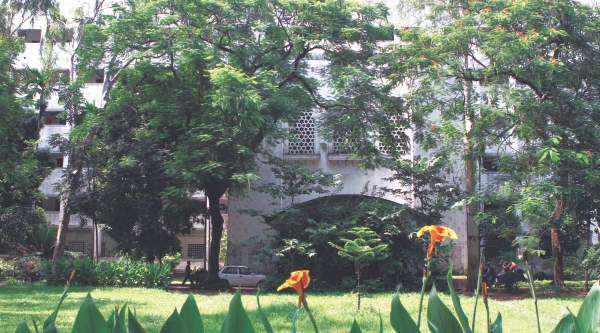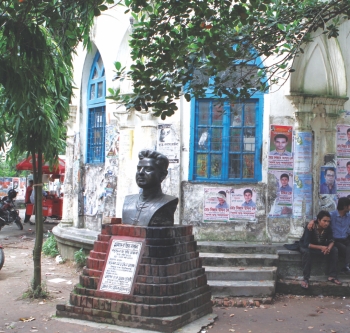| Home - Back Issues - The Team - Contact Us |
 |
| Volume 11 |Issue 20| May 18, 2012 | |
|
|
Impressions Spring Symphony Syed Maqsud Jamil
I was a child born after the Second World War and the partition of India. It was the end of the sixties. I was one of the privileged few in this region to go to university. It was a time when the world was going on with its business of getting into wars and turning on its bellicosity. It had seen the worst of wars, yet it would not rest. President John F. Kennedy was killed in 1963; America was getting mired in the Vietnam War; there was a 17-day Indo-Pak War in 1965; Arabs were routed by the Israelis in the six-day War of 1967. There was a brief spring in Czechoslovakia in 1968 and man was on the moon in 1969. And there was a nine-month scorching summer of undying resolve. There was Bangladesh. Every season has a story to tell; human stories. The spring that I saw and lived was naturally the best of time with no care or responsibilities to ruffle my young feathers. My mother tended her flock of four children in a modest middle-class family to the best of her abilities and with little word. My father, an uprooted village folk, made the most of whatever little his trade brought him. His passion was Sheikh Mujib and Joy Bangla. My alma mater, Dhaka University, was serene and picturesque. My campus, the Science Faculty, had the meditative air of a sanyasi. Big leafy trees branched skyward in great friendliness and the shadows lazed on the green fields and lawns. Curzon Hall with its congregation of other red colonial buildings stood with grace and majesty. The only building that spoke of the new age was the Science Cafeteria, sleek yet so ordinary where the students took a break to have a taste of their youth over tea and cigarettes. Spring was in the air, in their thoughts and in what they talked. It was a spirit unbound, threatening to bring the system and the earthen idol down from their pedestals. However. the defiance was at Modhu Da's Canteen at the Arts Faculty and the intellectual high ground at Sharif Miah's Canteen in the premises of the then Central Public Library. Aha aji aye basante koto phul phote koto pakhi gaaye O! In this spring many are the flowers that blossom, many are the birds that sing; songs, poetry and enchanting women flutter in many hearts to which they submit with great joy.
The female students were the subject of much attention at that time, as it is at all times. Our department had only three female students and one of them was already married. She was an apa or bhabi to us. The matter did not materialise into a romantic tale. That was not to dampen our spirit and interest. Many of us strayed towards the Arts Faculty. It was a fruitless exercise. One of our friends from the neighbouring department, where the girls outnumbered the boys gave us hope. He had his eyes on a girl right from day one, and kept on wooing her. Finally he won over the girl. They married and had four lovely sons. He was a tea planter and found success in life. But life had different designs for him. The end was tragic and our friend died this year of cancer. There was a familiar visitor at our Faculty who used to come riding a bicycle. He was a book seller of English books on subjects related to literature and civil service examination. Fazlu generally lingered around the FH Hall. Most students were 'uncles' to him. I fondly remember him. He had so much warmth about him and he made occasional comments about the books. He was a benevolent book seller, even selling books on credit. One day it was found that Fazlu was losing weight and his health was deteriorating. He fell seriously ill and went to his village home. I learnt he died there. It was not the time for him to go but he was gone. Fazlu nourished my love for books. Sharif Miaha, a native of old Dhaka, had his tin shed canteen in the compound of the then Public Library. He was a man of few words but was dear to the students. He served tea. The quality of the beverage was trésbien. The price was 10 paisa per cup. His delicacy was, however, the traditional biriyani cooked with the traditional excellence of his area. The palate never forgot the taste; the price was 50 paisa for half plate. I liked his reserved mien; naturally he had a select clientele of students of the Economics Department and those preparing for the civil service examination. Youth and eateries have natural camaraderie. My friends and the residents of FH Hall used to frequently go to Salimabad Restaurant for lunch and dinner during breaks. The restaurant stood where Ramna Bhaban now stands. It did brisk business most of the time. The four of us used to visit it for lunch followed by a movie at the chic movie theatre, ‘Naz’. A hearty lunch cost us Rs.1.50. It was the generosity of a covert pact with the bearer for which we paid him Re.1.00. There is always a personal episode to youth. Nope! No dalliance. I was looking for Lydia of Chekhov's 'House with an attic'. There was none. It was my pet dog, Lucky, a cross-breed terrier. My young heart found fulfilment in being its master. One day, when I returned home, I found that the dog was prostrate beside me. I enquired what the matter was. She had bitten to shreds my book Gustavus Flaubert's 'Madame Bovary'. I laughed heartily to find her moral uprightness in being repentant. What an irony for a creature of the animal world when the higher living beings, the humans, commit so many crimes and swagger around with impunity. Ultimately, time came for Lucky to die. Suddenly she was defecating and vomiting after eating. Within a few days, she died. For the first time I saw the death throes. Instantly the red ants were all over her body. I could realise the hunter in nature. The times of life have changed, as it has in the past, as it will in the future. Youth, whatever it offers, has its charms for those who lived it. The appeal lasts a lifetime. Only the human story will change. Media has an important role in scripting the tale. But in no way does it change the attachment nostalgic men and women feel for the time they lived in – the prime of their youth; it ushers many of us into life, love and living. Spring symphony is rightly the loveliest of tune in all ages.
|
||||
Copyright
(R) thedailystar.net 2012 |

